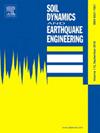Seismic failure analysis of a high arch dam-foundation multiple nonlinear coupling system
IF 4.2
2区 工程技术
Q1 ENGINEERING, GEOLOGICAL
引用次数: 0
Abstract
In this study, a high arch dam-foundation system model with more than ten million degrees of freedom was constructed. The model innovatively incorporates multiple nonlinear couplings of the strength failure of the dam body and stability failure of dam abutment blocks for the first time. A nonlinear dynamic response analysis of the coupling system was performed at different overload coefficients. The maximum damage depth-thickness ratio and sliding area ratio are proposed as performance evaluation indices. The failure mechanism of the model under strong earthquakes was elucidated. The residual displacement of the dam crest relative to the dam bottom in the stream direction is proposed as another performance evaluation index. Sudden changes and rapid growth are suggested as evaluation criteria to assess the ultimate seismic capacity of arch dams based on proposed multi-nonlinear coupled model. The results show that the strength failure of the dam body and stability failure of the dam abutments vary dynamically with the duration and intensity of the earthquake. Earthquake energy can be fully released by only one failure mode at low seismic intensity, whereas it is gradually released by both failure modes as the seismic intensity increases. The overload coefficient corresponding to the ultimate seismic capacity of the dam is concluded to be 2.0.
高拱坝-地基多重非线性耦合系统的地震破坏分析
本研究构建了一个自由度超过 1000 万的高拱坝-地基系统模型。该模型首次创新性地加入了坝体强度破坏和坝基稳定性破坏的多重非线性耦合。在不同超载系数下,对耦合系统进行了非线性动态响应分析。提出了最大破坏深度厚度比和滑动面积比作为性能评价指标。阐明了模型在强震下的破坏机理。提出了坝顶相对于坝底在流向上的残余位移作为另一个性能评价指标。根据所提出的多非线性耦合模型,提出了突变和快速增长作为评估拱坝极限抗震能力的评价标准。结果表明,坝体的强度破坏和坝基的稳定性破坏随地震持续时间和烈度的变化而动态变化。在地震烈度较低时,只有一种破坏模式可以完全释放地震能量,而随着地震烈度的增加,两种破坏模式都会逐渐释放地震能量。与大坝极限抗震能力相对应的超载系数为 2.0。
本文章由计算机程序翻译,如有差异,请以英文原文为准。
求助全文
约1分钟内获得全文
求助全文
来源期刊

Soil Dynamics and Earthquake Engineering
工程技术-地球科学综合
CiteScore
7.50
自引率
15.00%
发文量
446
审稿时长
8 months
期刊介绍:
The journal aims to encourage and enhance the role of mechanics and other disciplines as they relate to earthquake engineering by providing opportunities for the publication of the work of applied mathematicians, engineers and other applied scientists involved in solving problems closely related to the field of earthquake engineering and geotechnical earthquake engineering.
Emphasis is placed on new concepts and techniques, but case histories will also be published if they enhance the presentation and understanding of new technical concepts.
 求助内容:
求助内容: 应助结果提醒方式:
应助结果提醒方式:


